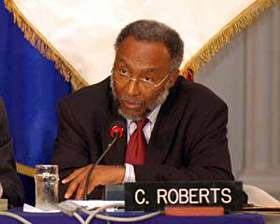 |
 |
 |
 News Around the Republic of Mexico | November 2005 News Around the Republic of Mexico | November 2005  
Inter-American Commission on Human Rights takes up Mexican Dirty War Case
 Eduardo Castillo - Associated Press Eduardo Castillo - Associated Press


| | Chairman of the Inter-American Commission on Human Rights, Mr Clare Roberts. |
Mexico City – The Inter-American Commission on Human Rights said Thursday it has taken up the case of a leftist activist who was last seen in the custody of Mexican soldiers in 1974.

The disappearance of Rosendo Radilla is the first case the commission has handled from Mexico's so-called dirty war – a bloody government crackdown on leftist guerrillas in the 1970s and 1980s.

Mexican human rights groups and relatives of the disappeared applauded the decision.

"A new road of hope has opened up in the case of the disappeared," said Radilla's daughter Tita Radilla.

Soldiers seized Rosendo Radilla when he was traveling on a bus in Mexico's mountainous southern state of Guerrero. He has not been seen since.

The Mexican government says it has received reports of 275 people who disappeared in police and military custody during the dirty war period. Some human rights groups claim more than 1,000 people went missing.

In 2002, President Vicente Fox named a special prosecutor to investigate political crimes committed under previous governments. But after more than three years, the prosecutor has secured no convictions.

In August, a Mexican judge ruled that the Radilla case should be handled by a military court. Tita Radilla appealed the decision and turned to the international commission.

Human rights lawyer Mario Solorzano said that Mexicans are being forced to go to international bodies because of the weakness of the Mexican justice system.

"The Mexican government has been incapable of meeting its obligations and resolving this case," Solorzano said.

The Inter-American Commission on Human Rights, which belongs to the Organization of American States, can make recommendations to governments but has no power to enforce punishments. | 
 | |
 |



